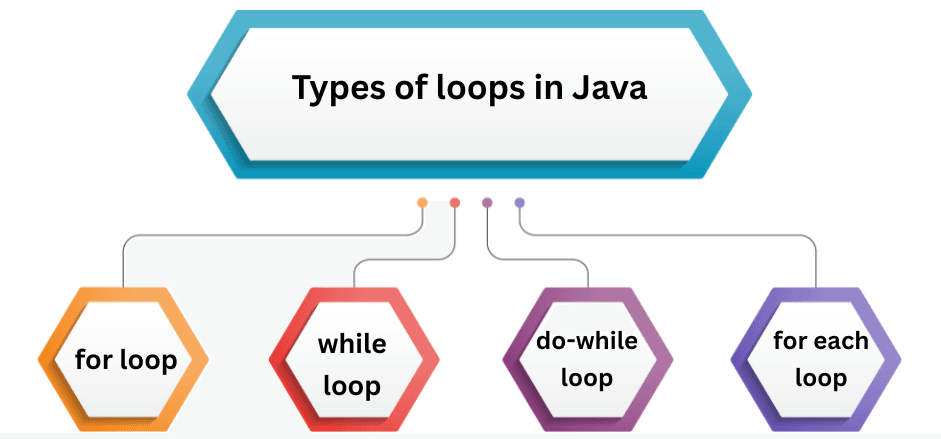Loops in Java
Loops in Java are used to repeat a block of code multiple times. They help automate repetitive tasks, reduce errors, and make your code efficient.
What Are Loops in Java?
A loop executes a block of code repeatedly until a condition becomes false.
Types of loops in Java:

1. for Loop
Used when you know how many times you want to repeat a block.
Syntax:
for (initialization; condition; update) {
// code to execute
}
Example: Print 1 to 5
for (int i = 1; i <= 5; i++) {
System.out.println(i);
}
Output:
1
2
3
4
5
2. while Loop
Used when you don’t know the exact number of iterations in advance.
Condition is checked before executing the block.
Syntax:
while (condition) {
// code to execute
}
Example: Sum numbers until total < 50
int total = 0;
int num = 1;
while (total < 50) {
total += num;
num++;
}
System.out.println("Total: " + total);
Output:
Total: 55
3. do-while Loop
Executes the block at least once, then checks the condition.
Useful when code must run at least once regardless of condition.
Syntax:
do {
// code to execute
} while (condition);
Example: Input validation
import java.util.Scanner;
Scanner sc = new Scanner(System.in);
int number;
do {
System.out.print("Enter a positive number: ");
number = sc.nextInt();
} while (number <= 0);
System.out.println("You entered: " + number);
sc.close();
4. for-each Loop
Used to iterate through arrays or collections without worrying about index.
Introduced in Java 5 (enhanced for loop).
Syntax:
for (type var : arrayOrCollection) {
// code
}
Example: Iterating through an array
int[] numbers = {10, 20, 30, 40};
for (int num : numbers) {
System.out.println(num);
}
Output:
10
20
30
40
Nested Loops
You can place one loop inside another. Useful for patterns, matrices, etc.
Example: Print 3x3 stars
for (int i = 1; i <= 3; i++) {
for (int j = 1; j <= 3; j++) {
System.out.print("* ");
}
System.out.println();
}
Output:
* * *
* * *
* * *
Example: Calculate Factorial Using Loops
import java.util.Scanner;
public class Factorial {
public static void main(String[] args) {
Scanner sc = new Scanner(System.in);
System.out.print("Enter a number: ");
int n = sc.nextInt();
int factorial = 1;
for (int i = 1; i <= n; i++) {
factorial *= i;
}
System.out.println("Factorial of " + n + " is " + factorial);
sc.close();
}
}
Output Example:
Enter a number: 5
Factorial of 5 is 120
🏆 Top 5 Java Interview Questions - Java Loops
1. Difference between for and while loops
Answer:
| Feature | for Loop | while Loop |
|---|---|---|
| Initialization | Done inside the loop header | Done before the loop |
| Condition Check | Checked at the start of each iteration | Checked at the start of each iteration |
| Increment/Decrement | Done in the loop header | Done inside the loop body |
| Use Case | When number of iterations is known | When number of iterations is unknown or based on a condition |
| Syntax | for(initialization; condition; increment) | while(condition) |
Example:
for(int i=0; i<5; i++) System.out.println(i); // 0 to 4
int i=0;
while(i<5) { System.out.println(i); i++; } // 0 to 4
2. What is the difference between while and do-while?
Answer:
| Feature | while Loop | do-while Loop |
|---|---|---|
| Condition Check | Checked before executing loop body | Checked after executing loop body |
| Execution Guarantee | May not execute at all if condition is false | Executes at least once |
| Syntax | while(condition) { ... } | do { ... } while(condition); |
Example:
int i = 0;
while(i>0) { System.out.println(i); } // Won’t print
do { System.out.println(i); } while(i>0); // Prints 0
3. When should you use a for-each loop?
Answer:
- Use for-each loop (
enhanced for loop) to iterate over arrays or collections when you don’t need index. - Simplifies code and reduces errors.
Example:
int[] numbers = {1,2,3,4};
for(int num : numbers) {
System.out.println(num);
}
4. Can we use a for loop without initialization or increment?
Answer:
- Yes, both initialization and increment/decrement are optional in a
forloop. - Example: Infinite loop
for( ; ; ) {
System.out.println("Infinite loop");
break; // to prevent infinite execution
}
- Any or all parts of the loop header can be omitted.
5. What is a nested loop? Give an example
Answer:
- A nested loop is a loop inside another loop.
- Inner loop executes completely for each iteration of outer loop.
Example:
for(int i=1; i<=3; i++) {
for(int j=1; j<=2; j++) {
System.out.println("i=" + i + ", j=" + j);
}
}
Output:
i=1, j=1
i=1, j=2
i=2, j=1
i=2, j=2
i=3, j=1
i=3, j=2

